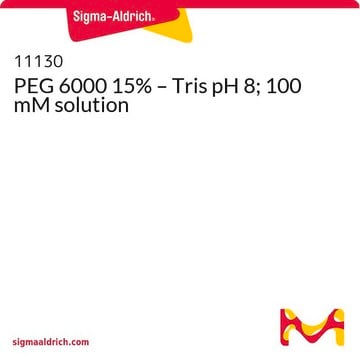81253
Poly(éthylène glycol)
BioUltra, for molecular biology, 6,000
Synonyme(s) :
PEG
About This Item
Produits recommandés
Qualité
for molecular biology
Gamme de produits
BioUltra
Forme
solid
Poids mol.
Mr 5000-7000
Impuretés
DNases, none detected
RNases, none detected
insoluble matter, passes filter test
phosphatases, none detected
proteases, none detected
pH
5.5-7.0 (25 °C, 50 mg/mL in H2O)
Solubilité
H2O: 50 mg/mL at 20 °C, clear, colorless
Traces d'anions
chloride (Cl-): ≤50 mg/kg
sulfate (SO42-): ≤50 mg/kg
Traces de cations
Al: ≤5 mg/kg
As: ≤0.1 mg/kg
Ba: ≤5 mg/kg
Bi: ≤5 mg/kg
Ca: ≤10 mg/kg
Cd: ≤5 mg/kg
Co: ≤5 mg/kg
Cr: ≤5 mg/kg
Cu: ≤5 mg/kg
Fe: ≤5 mg/kg
K: ≤200 mg/kg
Li: ≤5 mg/kg
Mg: ≤5 mg/kg
Mn: ≤5 mg/kg
Mo: ≤5 mg/kg
Na: ≤200 mg/kg
Ni: ≤5 mg/kg
Pb: ≤5 mg/kg
Sr: ≤5 mg/kg
Zn: ≤5 mg/kg
λ
50 mg/mL in H2O
Absorption UV
λ: 260 nm Amax: 0.15
λ: 280 nm Amax: 0.10
Adéquation
suitable for (molecular biology applications)
Chaîne SMILES
C(CO)O
InChI
1S/C2H6O2/c3-1-2-4/h3-4H,1-2H2
Clé InChI
LYCAIKOWRPUZTN-UHFFFAOYSA-N
Vous recherchez des produits similaires ? Visite Guide de comparaison des produits
Description générale
Application
Autres remarques
Code de la classe de stockage
11 - Combustible Solids
Classe de danger pour l'eau (WGK)
WGK 1
Point d'éclair (°F)
Not applicable
Point d'éclair (°C)
Not applicable
Équipement de protection individuelle
Eyeshields, Gloves, type N95 (US)
Certificats d'analyse (COA)
Recherchez un Certificats d'analyse (COA) en saisissant le numéro de lot du produit. Les numéros de lot figurent sur l'étiquette du produit après les mots "Lot" ou "Batch".
Déjà en possession de ce produit ?
Retrouvez la documentation relative aux produits que vous avez récemment achetés dans la Bibliothèque de documents.
Les clients ont également consulté
Contenu apparenté
Polyethylene glycol (PEG), also sometimes referred to as polyethylene oxide (PEO), is a condensation polymer of ethylene oxide and water that has several chemical properties that make it useful for biological, chemical and pharmaceutical applications.
Polyethylene glycol (PEG), also sometimes referred to as polyethylene oxide (PEO), is a condensation polymer of ethylene oxide and water that has several chemical properties that make it useful for biological, chemical and pharmaceutical applications.
Polyethylene glycol (PEG), also sometimes referred to as polyethylene oxide (PEO), is a condensation polymer of ethylene oxide and water that has several chemical properties that make it useful for biological, chemical and pharmaceutical applications.
Polyethylene glycol (PEG), also sometimes referred to as polyethylene oxide (PEO), is a condensation polymer of ethylene oxide and water that has several chemical properties that make it useful for biological, chemical and pharmaceutical applications.
Notre équipe de scientifiques dispose d'une expérience dans tous les secteurs de la recherche, notamment en sciences de la vie, science des matériaux, synthèse chimique, chromatographie, analyse et dans de nombreux autres domaines..
Contacter notre Service technique


